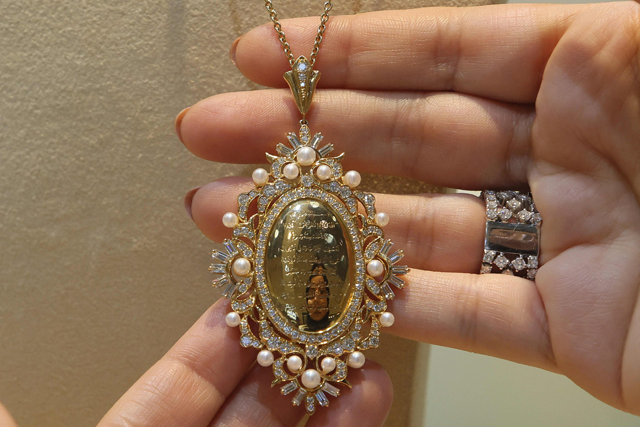You are here
Qatari female ‘pioneers’ bask in filmmaking spotlight
By AFP - Dec 02,2018 - Last updated at Dec 02,2018

Qatari women filmmakers pose on the red carpet during the Ajyal Film Festival at Katara Culture Village in the capital Doha on Wednesday (AFP photo)
DOHA — As Qatari filmmakers gathered on the red carpet at Doha's Ajyal Film Festival one thing stood out — the majority of local directors are women.
"I think this is a question that everyone is mesmerised by: the idea that we have more women in filmmaking here in Doha than men," said festival director Fatma Al Remaihi.
Among those showing movies at the annual six-day festival were Aisha Al Shammakh, Nouf Al Sulaiti and the rising star of Qatari cinema, Amal Al Muftah.
Their films focus on a variety of subjects, from "maligned" Qatari millennials and father-daughter relationships through to stories from the gas-rich country's recent and much less-wealthy past.
The women are redressing "many misconceptions about them around the world", said Remaihi, who also heads the Doha Film Institute.
The number of female entrants at this year's festival, which runs until Monday, is consistent with data from recent research.
A 2016 study by Northwestern University in Doha found that around 60 per cent of all emerging filmmakers in Qatar's nascent cinema industry were women.
Across the rest of the Middle East and North Africa region, the figure was around 25 per cent, the same study said.
The influx of women directors in Qatar comes at a time when the bright lights of Hollywood have been dimmed by the #MeToo movement's revelations.
And the fresh blood has helped diversify the nature of films produced.
Previously, one filmmaker jokes, it was "all pearl diving" — a reference to Qatar's main economic activity, before the exploitation of vast natural gas reserves.
But now the film topics are diverse.
One example of that is Sulaiti's short film, "Gubgub" (Crab).
Seemingly a movie about a day's crab hunting, it really focuses on a young girl's determination to prove she can rival her older brother at a "male" pursuit.
She succeeds by catching 10 crabs.
"I feel like it gives us a platform where we can express ourselves," said Sulaiti. "I don't think we had that platform or opportunity before."
"I want that little girl to believe that she can achieve whatever [she wants]. I want little girls to see that," the 25-year-old added.
And Sulaiti said younger Qataris would understand that message.
"In the past, we got an education, we got married and we stayed at home with our husband.
"I think slowly [Qatari] girls are seeing we can do whatever our brothers can do."
Conservative or progressive?
The emergence of female filmmakers comes at a time when conservative Qatar is seeking to portray itself as the progressive power in the Gulf.
This is especially true as Doha remains politically isolated by neighbouring powers in a bitter regional dispute.
Since June 2017, Qatar has been cut off by former allies including neighbouring powers Saudi Arabia and the UAE, which accuse Doha of being too close to Iran and sponsoring terrorism.
Qatar denies the charges, and has sought to present itself as the most tolerant of the Gulf states.
One of the most prominent Qatari figures during the Gulf crisis has been Lolwah Al Khater, the foreign ministry spokeswoman.
Beyond films, Qatar has the highest proportion of women — 51 per cent — in the workplace among Gulf nations, according to the United Nations.
In 1999, Qatar became the first Arab country in the Gulf to allow women to vote.
‘Like pioneers’
Muftah received a rapturous ovation as she was introduced at Ajyal and said filmmakers in Qatar were "like pioneers".
"I know from the outside it seems like there is segregation... but here really I feel like it's a level field... whether you're a man or a woman, you are treated the same," she added.
She directed "Sh'hab" [Shooting Star] showing at the festival, a story passed on from her grandmother about a girl who wants to go to sea with her father and brother, rather than stay at home.
Muftah rose to national prominence with a 2014 film “Al Himal”, about market porters.
She admits she had trouble convincing her family that she should seek a career in the arts rather than the sciences.
But she believes she can give a voice to generations of Qatari women through her chosen career, since she feels "really strongly about my position as a woman".
"The community of women in Doha — especially in this society — are very private," she said.
"And I just feel like as women filmmakers we have access to that community and to so many different stories."
Related Articles
DOHA — A Qatari businesswoman has turned heads at the Doha Jewellery and Watches Exhibition, pitting herself against giants of the industry
DAMMAM, Saudi Arabia — Officially it's not called "filmmaking" because public cinemas are banned in Saudi Arabia.But making movies is exactl
DOHA — Qatar has appointed women to one of its most important consultative bodies, the Shura Council, for the first time in the country's hi
















